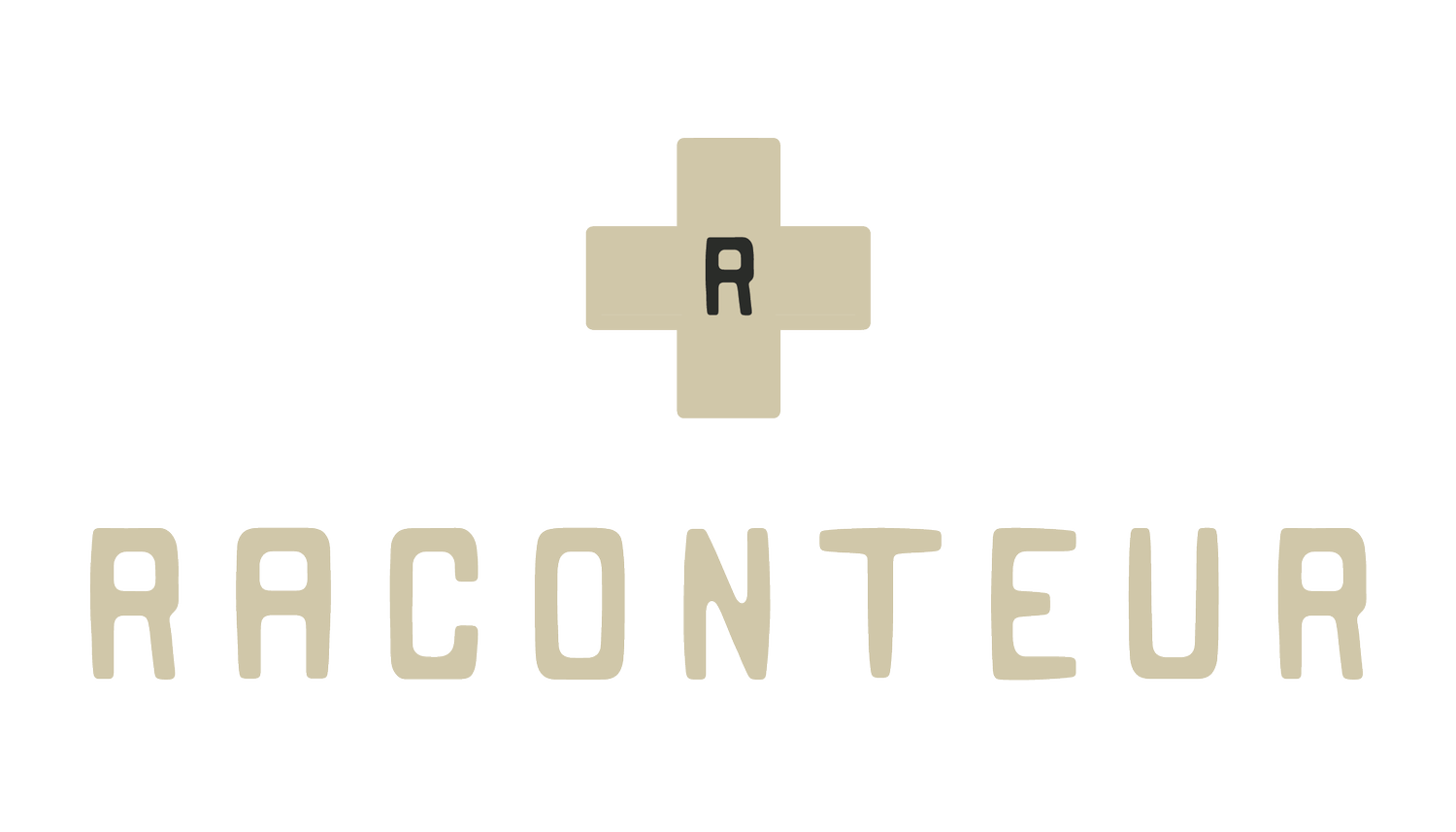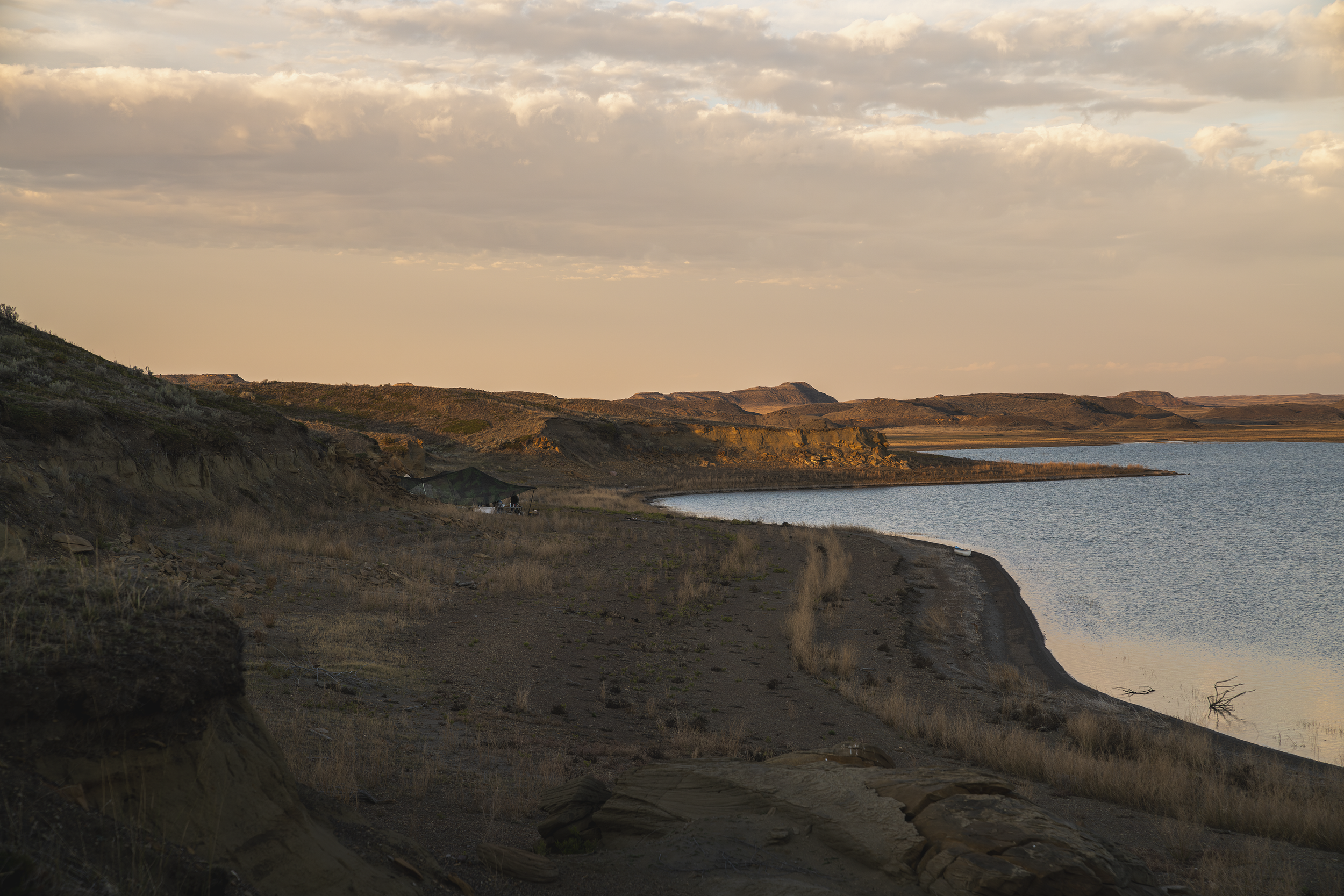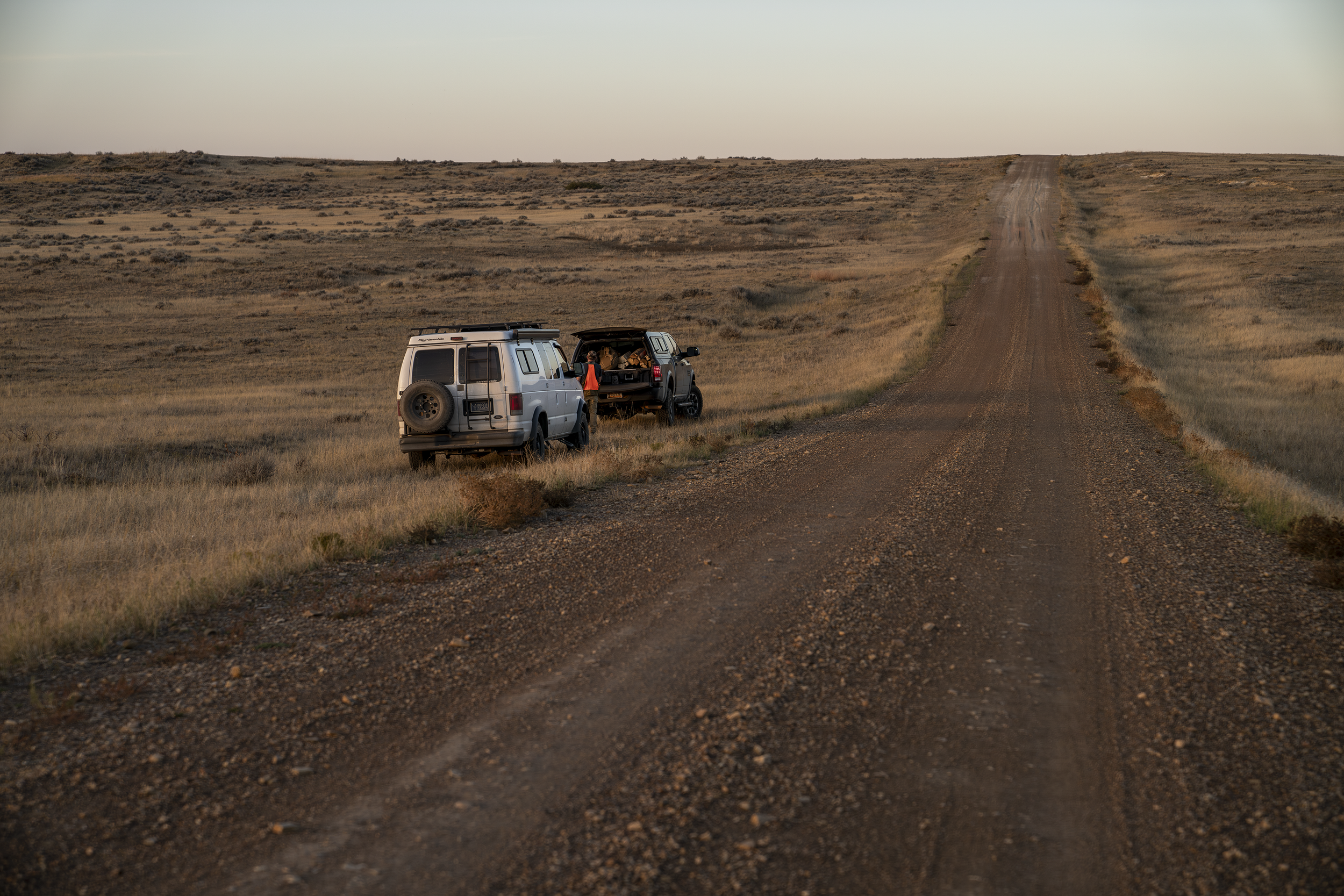Sediments
“It’s an ancient seabed. You can see it if you look hard enough,” my friend Josh says as he drives us down a two-track road cutting through the high plains. I’m beside him in the passenger seat. The sun is setting. I try to take pictures as we drive but give up, as it is futile.
Trailing behind us are our friends, Christian and Barry. They’re driving Josh’s converted camper van. We left Bozeman in the morning and have driven six hours east to the high plains of Eastern Montana. The Gallatin Valley gave way to the basin and range region, which in turn gave way to a landscape too reminiscent of Midwestern agriculture, before leaving us in the layered desolation of the high plains.
After a short hunt, we hop back in the vehicles to reach camp before the late October evening becomes full October dark. We’re meeting some of Josh’s friends who have been camped for a week, hunting antelope. We’ll stay the night, hunt birds in the morning, then Barry, Christian and I will hustle back across Montana to spend the next couple of days fishing and hunting grouse in the mountains.
I envision the seabed as we drive on. The sage brush turns into a green, aquatic plant floating in deep water currents. The rises, buttes and odd formations are covered by 2,500 feet of sea water. I see the sediments of each formation collecting in layers, brought there by shifting currents.
We make it to camp just as light fades. It’s a high plains oasis with a tarp awning covering a makeshift kitchen and plenty of sitting room, fifty yards from the water. Tents sit to one side of the awning; trucks sit further back and on the opposite sides of the tent. The lake cove runs perpendicular to the oasis like a long, crooked finger. It reaches out into a lake that extends for 134 miles. Men are milling about and warmly greet us as we approach. They feed us and offer good, sincere conversation. What more could strangers in the middle of nowhere ask for?
Mitchell hosts the camp. He has long, brown hair, an honest face and warm candor. Immediately, I like him. We talk about the seabed. “If you look at the base of the formations near the whitish soil, you can often find fossils,” he says.
“You mean the stuff that kind of looks like concrete?” I ask. He confirms. Our conversation moves on and we each drift onto talking to the others. But I see an ancient ocean give way to an arid high prairie in my mind’s eye throughout the rest of the night. The rock formations laid in sediments, the fossils laid at the feet of the formations, I’m present in camp, but also somewhere else, caught in time.
The world has a memory. It’s in the shape of rocks and the layers of earth; it’s in the curve of a fang and the speed of the pronghorn. We take our part in it, our narrow, human part that searches the collective memory of all the earth and adds understanding to the extent that we can—shallow at first, but probing. Our minds give meaning to the sediments, and we see our own. Dark. Light. Characteristics. Memories.
It's a clear night, so Josh and I take pictures of the Milky Way. I look at the night sky and do my best to follow Josh’s instructions; he’s a more experienced photographer than I am. I’m happy. I feel small.
Then I’m alone in a tent. The night is dark and quiet; sleep isn’t ready for me and I’m not ready for her. I excavate the layers of my own formation. I’m in a wonderful place with good men. How did I get here? My roots reached down into dark sediment.
It was a shotgun blast from a .410 loaded with a slug. I held the gun as it hung out the window of my dad’s Ford Bronco. He held the spotlight on the deer, a doe. I pulled the trigger; she fell as soon as I did. “Nice shot, Todd!” he said. I was happy. I was eight years old. It was dark.
I couldn’t know then how dark it was. That took time and relationships with other people. It took observation of who my father was in all aspects of his life, but specifically his continued attempts to indoctrinate me as a poacher. Then I saw the darkness and for a long time hated it. But who would I be without it? Is it not darkness that allows the light? Without it, I would never sleep on the high prairie or meet all the good people I’ve met outdoors. I would not be the ethical hunter I now am.
Most hunters have fond early memories. They sit by a tree with their grandfather, learning to see the natural world. They are led through the woods by careful parents. Not me. Instead, I have memories of being eight years old and killing my first deer in the glare of a spotlight.
Or being fourteen and my dad saying, “Get out and shoot that deer.”
I remember replying, “Dad, come on!”
And he yells, “Do it.”
Then I see myself, resting my .30-06 across the hood of his truck as he parked in the middle of the road and shooting a deer on private land we didn’t have permission to access.
After that, I see a man who was out walking his dog come up to our truck and get our license plate and say to my dad, “Boy, you’re sure teaching him right, aren’t you?”
I hear my dad reply, “Now, wait a minute, let’s talk about this.” Then I see the man turn around without another word, and walk away.
The next image is my dad almost driving us off the road on the way home and me yelling, “Dad, pay attention!”
He yelled back, “Shut the fuck up, Todd!”
The game warden came to our house that afternoon to issue our citations and fines.
My father taught me to sin against the natural world and, in consequence, myself. The sin grew a dark shadow in me that led me to loathe part of who I was; it drove me away from hunting for a time and into the bustling distraction of a career.
Coyotes yipping. I’m awake, pulled from a dream I fight to remember but can’t. It’s still dark but it feels like I’ve slept all night, like I’ve gotten the best sleep I’ve had all year. I check my phone—5 AM. Some of the guys mentioned they’d get up at five to fill their final antelope tag. No one stirs in camp. I lay for a while and wonder if I should go back to sleep. Then I remember the sunrise. Light. I dress, grab my camera, and hike up the rise behind camp. The top is a flat expanse that runs all the way to the bluff before dropping into the lake. I walk east.
It's still dark, but a halo of light contrasts the horizon, splitting black earth and dark purple sky. The halo rises, dividing the sky into teal and orange, projecting light onto the ripples in the water. I am here. My camera hangs by a loose grip in my right hand. In the midst of purple becoming orange-teal, the water lapping the shore, the breeze kissing my face, I’d forgotten it. I take the moment I want for myself. Then I start capturing moments to share with others. Light.
I find moments spent with others lay the lightest sediments in the formation of our memory. The brightness of our spirit shines through in time shared with people who love us. And that goodness lays another layer of soil, soothing the jagged edges of who we are. I’ve enjoyed many solo hunts, but I don’t remember them as vividly as those I’ve spent with friends. Maybe it’s the laughter. Maybe it’s the shared time and space that lets me know I’m not alone. Maybe it's love.
My mind drifts.
A few years back, another trip to Montana. Christian and I are in a narrow, dark-timbered valley. We’d just reached the trail after a steep climb. Before ascending, we traversed a tangled old burn and crossed a stream flowing rapidly through the trees. Christian’s mule deer buck and all our gear rests across our shoulders. Twilight is upon us and we have miles to walk in the dark…in grizzly country. I see Christian’s hands contort as he lifts them from his trekking poles.
“I need a minute,” he says. He’s cramping. I help him with the last of his water and offer him some of mine. I look at the mountains, the stream we’ve crossed, the steep side we’ve just climbed. I laugh. Gonna be a long night.
We start down the trail; we don’t need our headlamps yet, but soon. “Hey bear,” we each holler, loudly enough, we hope. Every 30 seconds, it’s “hey bear!” Monotony. We need fun. I start to sing, “Heeeyyyy, what’s the matter with ya…” Christian catches on. It’s “Come and Get Your Love” by Redbone. He joins me, loudly and terribly, wonderfully.
The light leaves us. We’re in the full black of a dark timber pine forest, the trail choked by trees. My head lamp shines on the trail; Christian’s head lamp shines on me. We sing the chorus to “Come and Get Your Love” until it wears out. We don’t know the rest of the lyrics. Truth-be-told, I don’t think anyone does. Christian sings another song, it’s Smashmouth or some other such silliness from our time as kids growing up in the late 90s. My legs fatigue. My back aches. I know Christian feels worse.
We march on, headlamps on the trail, songs in the air, until we reach the truck. Drop the tailgate and fall into the bed. Reclining, we free our shoulders of their burdens. We put the meat on ice, toss our gear in the bed and lay our rifles carefully in their cases. Then we collapse into the seats in the cab. I drive so Christian can rest. Our headlights point towards Bozeman. We recount the day with blood on our hands. We are happy. Light.
Back to morning breaking across the high plains. The sun is higher in the sky, transforming the orange to a pink reflection in sparse clouds, turning the teal to a deeper blue. Deer tracks in the sand beside the lake. I stop to frame a picture, snap it, then I stand up and look around again. I’m alone, but I’m not. I am there with myself—connected, nowhere else.
My feet and my eyes are in the same place. Connection is what lays the light layers of sediment. Yes, it’s often that the connection is with another person—a morning spent looking into the eyes of the one you love while the rest of the world moves around you. A day walking arid ground looking for birds with guys you know the world will miss when they’re gone.
But then the quiet moments where we get to connect fully to ourselves, to place, to time layer bright memories into the seabed of our lives. I fear many people can’t find themselves in the quiet. They don’t get enough moments alone to allow the layers to form, letting in the light and reconciling the dark.
It’s time to walk back to camp. We’ll soon leave to hunt. I bend around the bluff and walk the shoreline from the main lake back into the cove. The green tarp awning stands out against the brown and yellow land. The curve of the shoreline juts and recedes. I stop to take photos. Back at camp the guys ask me if I got any good shots. I say I hope so.
The day is bright and beautiful, just cold enough for a t-shirt under a flannel if you’re walking. My travel companions stir and join the rest of us. The hospitality continues, we are treated to a breakfast so good, I’m not sure we deserve it. But a meal given is about acceptance not about deserving. It has taken me longer than it should have to know this. We eat with gratitude, say our goodbyes and I’ll-see-you-soons, load up and drive away.
Mitchell told us about a spot where he saw birds the day before while antelope hunting. We head there. Huck, Josh’s black lab, works in front of us as we line out on an expansive hillside. Flats of sagebrush and yellow grass spread until they reach rises of barren earth—white, tan, red, brown, black. The layers climb skyward until the land again flattens and allows the return of sage and grass. The horizon feels days away.
The vastness of the landscape reflects your own internal vastness, making you aware of it, expanding it. Less of you is contained; there is more of you in everything else. Your ego dissolves as your feet crumple dirt and your pants brush the sage. You take an honest look at each layer of yourself. A covey rises. Shotguns blast, one is your own.
All birds but one escape across the horizon. It locks wing and sails downward. We mark the spot where it fell and send Huck. He searches and searches. We search and search. The bird is never found. It is lost. Dark. For an instant, I’m eight years old in the passenger seat of a Bronco. For another, I’m fourteen standing in the middle of the road with a rifle in my hand.
It is at this point the killing feels senseless. Outwardly I may say—things die, we helped another predator by offering an easy meal. The rational mind, however, cannot fully ease the truth of being human when we are reminded of our own darkness. I’m glad it can’t. Our moral compass must be valued for it to remain. Without awareness of our darkness, we become slaves to it, or we are shocked when it does appear.
Hunting, killing has kept me in tune with my darker sediments and integrated them peacefully into the other parts of who I am. I am not shocked by what I know I am capable of doing. And I’m not a slave to my darker memories.
We hunt on among the sage and the grass, among the striated earth. No more coveys rise. I’m grateful for the moment. I’m happy to be here walking with good men, to share the light of connection, to share the darkness of killing. I look at the formations in the earth and notice the striations aren’t equal in balance. Light often layers on light, darkness thins or thickens at times.
It is the contrast in layers of experience which give meaning and make them worth remembering. In sediments we find the burial grounds of our past selves, light and dark. We cannot forsake the dark in favor of the light, nor judge the whole because for a time, the dark sediment became the top layer.
Rain’s coming in and the dry dirt of the high plains will soon become an impassable gumbo. Christian, Barry, and I decide to head back to Bozeman. Josh decides to wait it out a little longer. To each their own.
I pilot the van down the road that cuts the prairie. We’re still miles from the highway. Looking at the land, I see the past as it progresses into the present. We are a sum of sediments, layers of past selves in an ancient seabed now rising in our unique shapes against the skyline.





